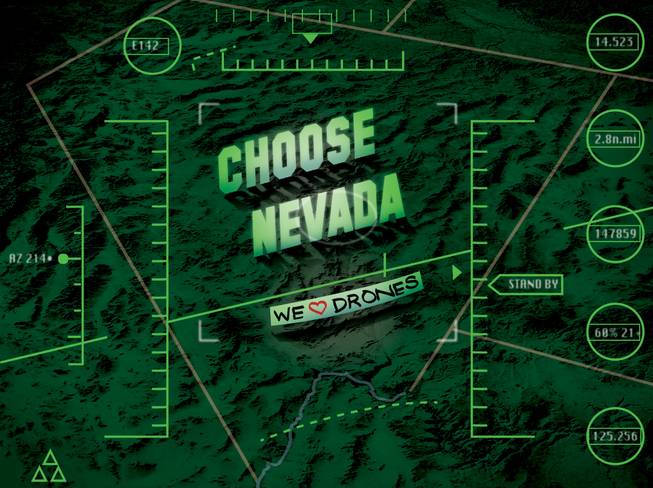Sunday, March 3, 2013 | 2 a.m.
Bid team
The Governor’s Office of Economic Development is co-chairing a team of state, military, corporate, environmental and university members, each of whom are contributing their individual expertise to Nevada’s bid to host an FAA domestic drone test site. The team is:
• Steve Hill, Governor’s Office of Economic Development, co-chairman
• Gen. Bill Burks, adjutant general of the Nevada National Guard, co-chairman
• Marc Johnson, president of UNR
• Steve Wells, president of the Desert Research Institute
• Neal Smatresk, president of UNLV
• Joe Brown, Fennemore Craig Jones Vargas
• Ray Juzaitis, NSTec
• Tim Wong, Arcata Associates
• Greg Cox, Sierra Nevada Corp.
• Jeff Fontaine, NAoC
• Leo Drozdoff, Nevada Department of Conservation and Natural Resources
• Ken Witcher, Embry-Riddle Aeronautical University
• Rudy Malfabon, director, NDOT
The Commanding Officers of Nellis AFB, NAS Fallon, and Hawthorne Army Depot also have standing invitations to participate.
Last month, the Federal Aviation Administration announced the start of a national bidding process in which states can compete to host one of six sites for testing unmanned aerial vehicles – drones – intended for use in the United States.
To the victors go an early bite at what experts project will be anything from a $10 billion to $100 billion-a-year industry that, despite lingering controversy over privacy with domestic drones, is all but guaranteed to grow.
More than 30 states have already expressed an interest in applying to host a site, but Nevada’s about as confident as a state can get that it has one of the FAA designations in the bag.
“We think we have quite a bit to offer. … I’m optimistic about the proposal,” said Steve Hill, executive director of the Nevada Governor’s Office Economic Development, which is spearheading a statewide effort to put together a winning bid. “We just see this as a real opportunity for Nevada to get in on the ground floor of something where we really can be a center for an industry that is growing.”
Sun Archives
Hill, who is co-chairing the team drafting Nevada’s bid, chose his words as diplomatically as one must when part of a formal, national bidding process that won’t conclude until the end of the year.
But the truth is, Nevada has been making the hard sell to the federal government for more than a year, enlisting help from the state’s universities, its defense contractors, its military officials and its congressional delegation.
The six FAA drone sites under development have their roots in a law Congress passed in early 2012 to reauthorize FAA programs. Nevada’s chief focus during the drawn-out process of passing that bill was the potential cessation of service to rural airports and the interruption of funds to support rampant expansion at McCarran International Airport.
But alongside those provisions was a direction to the FAA to develop standards for licensing operators to fly drones in commercial airspace by the end of September 2015.
The states selected as hosts to the test sites will get an early jump on that clearance – and with it, a chance to attract the best UAV developers and manufacturers to set up shop in the Silver State.
“If we can be certified, that would then lead to the potential of future economic development related to UAVs in the state,” said Alan Gertler, vice president at the Desert Research Institute, one of three major research centers in Nevada participating in the state’s official bid. “Given Nevada’s economy, it’s critical that we look for additional areas of economic development.”
The FAA designation would fit neatly into Nevada’s efforts to diversify economically. Meanwhile, architects of the proposal feel there is plenty Nevada can offer the federal government.
“There is already a commercial industry here in Nevada – it’s not huge, but the commercial industry in UAVs is not huge anywhere,” Hill said. “Drones are also a very data-intensive environment, and we have the IT infrastructure to support that, in places like the Switch data center in Las Vegas.”
The federal government already relies on the source of Nevada’s technical expertise: Switch, which has built a reputation as one of the country’s most secure data facilities, is equipped to manage the massive inflows of electronic information collected by drone surveillance.
Nevada also boasts one of the country’s most experienced team of drone operators: Military retirees who once worked at Creech Air Force Base, manning the service’s first fleet of drones.
For more
The FAA bid has nothing to do with the military – the drones the FAA hopes to regulate would instead be destined for use in emergency response, environmental exploration, agriculture, and yes, surveillance – a last point that has organizations like the ACLU and activists in various states and municipalities attempting to prevent drones from operating overhead.
The Nevada Legislature isn’t considering any such proposals from the ACLU, which removes the hurdle of those who say drone licensure would lead at best to a complete loss of privacy; at worst, to the type of over-surveillance characteristic of a police state.
And the fact that Nevada plays host to a test and training range for the military’s drones may be the state’s strongest selling point for becoming the proving ground for commercial UAVs.
“We have probably by far the largest airspace in any state that’s available,” Hill said, adding that Nevada’s vast uninhabited federal land also muted any privacy concerns that would come with a drone testing site.
“In order to test the UAVs at different altitudes, it takes some distance in order to achieve the altitudes desired,” Hill said. “Unless somebody in a different state is going to want to corkscrew up and then back down, the fact that we can fly for hundreds of miles is an obvious benefit.”
Nevada has the largest expanses of restricted airspace anywhere in the continental United States. The bid-making team, led by Hill and Nevada National Guard Adjutant-General Bill Burks, imagines an operation zone that would reach from Northern Nevada base points at Stead Airport near Reno and Fallon Naval Base, and extend southwards through rural areas of the state.
The plan is to use a combination of restricted airspace and contiguous commercial airspace for the drone tests.
“The folks in our office and the military and sort of the panel who work on this on a regular basis have spent a lot of time coordinating that effort,” Hill said.
A representative from Nellis and Creech Air Force Bases responded, but ultimately did not answer the Sun’s questions about how the military was assisting the governor’s office with its bid.
But those making the pitch planned a collaborative approach from the beginning.
“We had Nevada in mind” when the legislation was being written in committee and voted on in Congress, Sen. Harry Reid’s spokeswoman said, though she stressed that the drone testing program requirements were not tailored to any particular state.
The FAA’s program requirements do instruct that a state-sponsored entity must make the bids to host the sites. But Nevada’s full-court press of multiple state-level agencies, federal and military partners, and private corporations is an orchestrated approach.
For the past several months, Reid has been using the power of the majority leader’s office to get the governor’s office on the same page, not just with the delegation but with the FAA itself.
“He has stayed engaged, setting up meetings between Gov. Brian Sandoval’s office and the FAA – including meetings with the administrator and the individual responsible for the bidding process,” Reid’s spokeswoman said.
The meetings are more access than most bidding states will have to the FAA, and is a perk of having the Senate Majority Leader in Nevada’s corner.
But it also illustrates just how important the FAA designation is to get this industry going.
Hill and others have pledged that Nevada will pursue the development of a domestic drone industry, with or without the FAA’s official blessing.
“What it would be, I don’t want to be too flippant here, but it’s kind of a Good Housekeeping seal of approval,” Hill said. “We don’t need it. We would like it.”
“That’s the beauty of it: Because we have the restricted airspace, we don’t need the FAA’s permission,” said Nevada Rep. Joe Heck, an enthusiastic booster of Nevada’s bid. “That allows us to do a lot of this work without being one of the designated pilot programs.”
The FAA designation comes with no money, meaning it will be incumbent on Nevadans to build a commercial industry from the ground up, with or without the FAA designation.
But the scientists involved, who are used to navigating the delicate nexus of federal permissions and contracts, say without the FAA’s nod, the state will be sorely at a disadvantage -- because of competition.
“It’s crucial,” Gertler said. “Why would Boeing, for example, come do anything here if we don’t have the certification? You’ve got to go to a place that’s certified.”
But Gertler doesn’t want to be mistaken -- he’s feeling pretty good about Nevada’s overall chances at a winning bid.
“Nothing’s ever a lock,” Gertler said. “But Nevada has a unique combination of resources that can make this happen.”



Join the Discussion:
Check this out for a full explanation of our conversion to the LiveFyre commenting system and instructions on how to sign up for an account.
Full comments policy